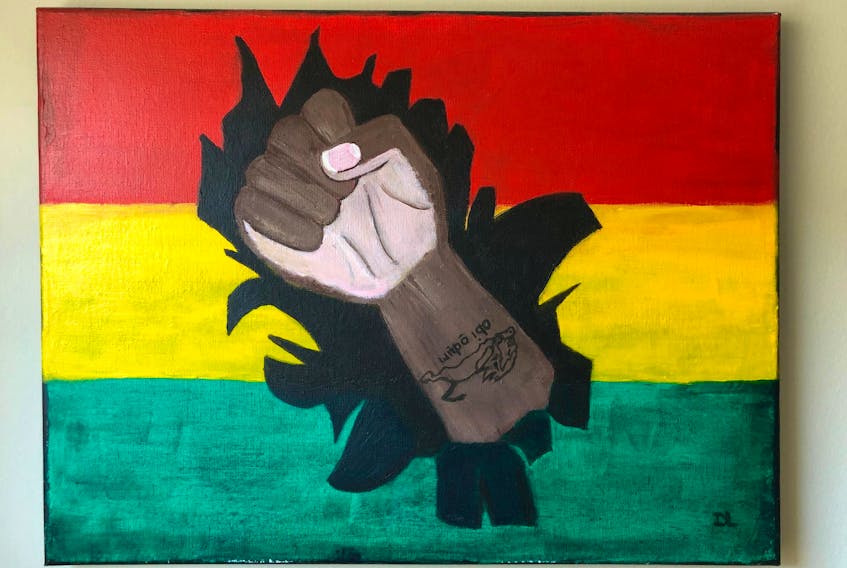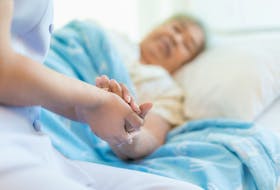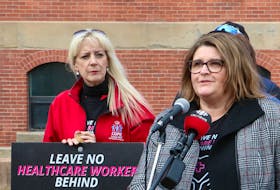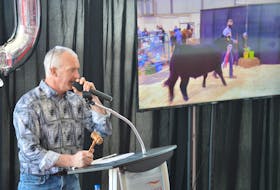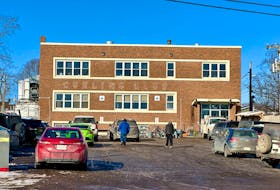Editor's note: In the following commentary, Prince Edward Island's Debbie Langston shares her experience as a Black woman living in these divisive times.

I wrote this opinion piece thinking of Lisa, a woman in the U.K. who hijacked a conversation between my sister and me. Lisa is a white woman; she is no one but she could be everyone. Lisa is everywhere, she thinks she understands racism better than any Black person. When her views are challenged, she retreats to a position of denial, safe in the knowledge that Black people have a chip on their shoulder.
Dear Lisa: Here's why Black Lives Matter.
Recently, I wrote an op-ed about gendered impacts of the COVID-19 pandemic. In it, I talked about my apathy, induced by an uncertain future, but I stated that as a Black woman in P.E.I., I had much to be grateful for. What I didn’t say was that I knew the virus was disproportionately infecting and killing Black people and minority groups around the world. I knew it, and it grieved me, but the pain was something I kept silent about, as did countless others. Then George Floyd was murdered by police, and the world shifted.
Many of you will sigh inwardly at the mention of his name. I have heard all of the arguments; that he is no loss to society, that he should not be hailed as a martyr or a hero by a community. I have heard how his death is no excuse for the looting that has followed.
I am not here to judge how George Floyd lived his life, that is the job of a fair and impartial justice system. A system that upholds the inalienable rights of a person to be judged by a jury of their peers and sentenced accordingly. I am not going to discuss our flawed justice system today, nor am I going to defend the actions of the few that are being used as an argument to drown out the voices of the many oppressed. I want to talk about why the death of George Floyd is a catalyst that has shaken the world and why, like a dam bursting, it has triggered such an outpouring of collective grief, centuries in the making.
As George Floyd died, so did the dreams and hopes of Black people around the world.
How does a society reach the moment when a white man, a police officer, sworn to serve and protect, can appoint himself judge, jury and executioner? Murdering an unarmed, restrained Black man in public view, as he begged for his life. As George Floyd died, so did the dreams and hopes of Black people around the world. The message was clear: whoever you are and whatever you do as long as your skin is Black, your life holds little value. Your life does not matter. Whether George Floyd or one of the many others too numerous to name (a 12-year-old boy playing in the park, a teenager out buying Skittles or riding a streetcar, a woman asleep in bed, a man out for an afternoon jog), your life is subject to others’ choosing.
For many, George Floyd’s dying cry for his mum served as a rallying call to mothers. For mothers from Black and marginalized communities, his cries were a stark reminder of a fear we hold onto from the moment we give birth, a reminder of the vulnerability of our children’s lives and what it means to be born Black. Systemic oppression has been suffocating Black people’s lives for 400 years. Racism that culminates in a public execution starts when there is an imbalance of power in society; an imbalance that is understood by all of its members. Murder is at the end of a continuum of discrimination when that power is used to oppress and subjugate the disempowered.

Racism starts in school when your biracial son is racially bullied for years. He and his sisters endure verbal and physical abuse that is ignored. Your son looks at you with so much anger you don’t understand why, until a dear friend asks you if you have ever considered that he is angry at you because you made him Black. And she is right. Your son is treated as the problem and told, “Go away and stop causing trouble.” It takes years of fighting with officials for an apology for your son’s treatment. Some attempt is made to improve things. But there will be many more times when you have to advocate for your children. The feeling that your son is angry at you for his Blackness is pain that will never leave; retelling this story will still make you cry.
Racism starts with all the microaggressions and overt and covert discrimination you and your children experience on a daily basis. Each instance lies heavy like a rock that you add to your pack until it weighs you down, crushing your spirit. Racism ends when the dehumanization of a race means that their murder is inconsequential. It lies in the jeers of white youths when they shout “Nigger!” at you and your children as you exit the 2014 Celebration Zone in Charlottetown, in front of a policeman and countless people, and no one intervenes. Racism tears at you in the panic-stricken text you receive in the middle of the night from your son because he has been stopped by the police for a broken tail light, and he is scared. No one should have to live with that fear.
Racism is hidden in small gestures, having your hair patted at aged seven by 30 of your classmates at the invitation of your teacher, being asked where you are from and, when you respond, being asked “But where are you really from?” And it lies in big acts of racial abuse and not getting an interview for a job working with minorities when you are more qualified than the successful white male candidate. It starts as a teenager when you are out with a group of noisy white friends and an elderly male approaches and racially abuses you. Your well-intentioned friends ignore your requests to walk away, and argue back, making the situation much worse. It is embedded in your country of birth, when as a young adult out walking your dog, two sweet-looking, elderly white women are comfortable enough to approach you and tell you to go back where you came from.

Racism is hidden in plain sight when as an adult you are objectified by white males who believe they can walk up to you and say anything they want. After all, they know about Black women, they have learned all about you through the media and on National Geographic programs. It is in the silence that descends when you walk into a crowded Tim Hortons as all eyes turn to watch you. It is in the passive-aggression when you are repeatedly called a “Nigerian Princess” by a colleague at work. You leave, and she gets promoted.
It is in the hostility that you are addressed with, when as a 47-year-old woman waiting in a liquor store as your daughter makes a Canada Day purchase, a store clerk demands you produce ID which you have left in the car, before she orders you to leave the store, loudly berating you as you do. It is when you later return to complain, and the manager attempts to justify the clerk’s behaviour, ignoring you while explaining to your white husband, “Look at her, it is because she is so beautiful and young-looking,” that the clerk needed to see your ID.
It is being racially profiled when you are leaving an international chain store as the greeter leans around white shoppers and asks to see your receipt. It is in the humiliating escalation that ensues when you assert your civil rights and decline, tired of being repeatedly stopped. It is when, after a year of your complaint being ignored you file a Human Rights Complaint which you subsequently drop: the store has infinite funds and lawyers at their disposal, and it is your word against theirs. You know no one will believe you because you are Black, and the emotional exhaustion just doesn’t feel worth the fight.
You can find racism in the comments section of articles about the Black Lives Matter March. Yes, my life is more important than your grandchild’s rite of passage, yes, it is more important than your golf tournament, and yes, it is more important than your wedding that took a year to plan. These things are all important: they are rituals of the society in which we live and are part of the rights and freedoms we are all granted under the Canadian Charter of Rights. But they are not more important than the life of any Black, Indigenous or Person of Colour who needed to march to assert our lives matter.

There have been times when I have wanted to rail against the treatment I have endured. To scream that I am a good person, a law-abiding citizen, a loving mother and wife. That I like to cook and garden and dance and that my vocation is to care for others. I want to shout that although I am not perfect, I am flawed like everyone else, I strive to be the best person I can be. I want to leave the world a better place than it was when I came into it. But I do not. I assert myself, but I am careful not to reveal too many emotions. I know that if I express anger, rage or grief, the people looking on will reassure themselves that I am everything the stereotype portrayed by the media and society purports me to be, and they will remain safe in the unquestioned biases they use to justify their complacency. Instead, I choose to maintain my dignity, for that is something that cannot be stolen. I know my truth, and I withstand the pain inflicted upon me. It is another stone that I must add to the load.
My life as a Black woman has had its challenges, yet I know I have been lucky. I would choose to be the same person all over again. My love for who I am does not diminish the burden I carry. If my story has hurt your heart, I make no apology. It is a snapshot of my life. The pain I feel is real, and it is mirrored by BIPOC people all over the world. If my use of the word Nigger has offended your sensibilities, again, I make no apology. It is a word that is used against us so often we have to become immune to its effects. My strength comes from the unity and the solidarity of my sisters and brothers. Together we hold fast and push for a better world. If you do not see your place in this struggle then step aside, there is no space here for you. Our story is of a struggle that is hundreds of years in the making. Ultimately, it is a story about humanity.
Our story is of a struggle that is hundreds of years in the making. Ultimately, it is a story about humanity.
This is the hardest thing I have ever written. Laying bare your pain for others to read is not easy. I hope that in taking the time to read this you have a better understanding of what it is to be a minority in a white person’s world. I hope you will use your power for good to advance the rights of others, so that we may all live in a just and fair society.
Next time you witness something being done to a Black or marginalized person, and in your gut you know that it doesn’t feel right, intervene, use your voice and your power to let them know that you are there and that you see them.
Debbie Langston of Blooming Point is the chairperson of the P.E.I. Advisory Council on the Status of Women.

